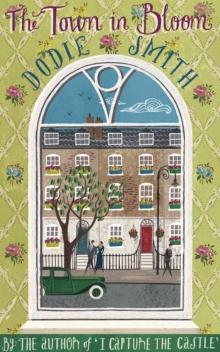- Home
- Dodie Smith
A Tale of Two Families Page 2
A Tale of Two Families Read online
Page 2
May said, as they came downstairs, ‘What a waste that we don’t need this.’
‘Would you be allowed to let it?’
‘I shouldn’t think so and anyway I shouldn’t care to. I suppose we could lend it, but we’ve no friends I fancy having so close. Oh, my God! Yes, of course!’ The light in May’s eyes suggested a soul’s awakening. ‘You must come and live here. Oh, how marvellous!’
‘You’re raving mad,’ said June. ‘It’s out of the question.’
‘But it’s absolutely ideal. Robert told me only last week how he wished he was moving to the country.’
‘I dare say. But what about his work?’
‘How often does he go to Fleet Street?’
‘Oh, several times a week.’ It wasn’t true. He seldom went more than once, to deliver work and collect more books to review. And he was longing to take a year off from reviewing to write one of his novels (those novels which were so highly praised by important critics, but earned only a few hundred pounds). But coming here remained out of the question.
‘Well, he can go up with George, either by car or train.’
‘Railway fares are expensive. And what about Hugh? He couldn’t come down here every night. He works later than George.’
‘He could go to our flat, with Corinna. She wants to stay there until she finishes at her Drama School.’
‘What, the two of them all on their own in the flat?’
‘Certainly. And if they want to pop into bed together, why not? Then they might get over wanting to marry.’
‘They won’t get over it,’ said June. ‘They’ve been in love since they were children. And I think it’s cruel of you to be so against them. Lots of cousins marry.’
‘They’re double cousins.’
The sisters had married brothers.
‘Anyway, they will marry, whatever you say, just as soon as Hugh’s in a position to, which ought to be fairly soon.’
‘I know,’ said May, gloomily. ‘George is delighted with him.’
Hugh, June’s twenty-year-old son, worked with his uncle in the City.
‘Anyway, that doesn’t affect the fact that we can’t come and live down here. What about Baggy? There’s no room big enough for his huge furniture.’
Baggy, the sisters’ father-in-law (his nickname, originating in some now barely remembered family joke, was used even by his grandchildren) had lived with June and Robert ever since the death of his wife, ten years earlier – or rather, they had lived with him, in his large Edwardian house in the outer suburbs.
Only for a moment was May stumped. Then she said triumphantly, ‘Baggy can live with us. He can have that big room with the tall windows – it’ll make an ideal bed-sitting-room. He’ll love having his own bathroom, surely?’
And I’d love his having it, thought June. Baggy, the kindest and least burdensome of old men, always avoided the bathroom during rush hours, but once he got into it he stayed an unconscionable time. And it would be very, very pleasant to be on her own with Robert in this exquisite little house – and Hugh and Prudence too, of course, whenever they could come. And Prue would so love the country in her holidays. All the same, it was still out of the question. She said firmly, ‘Darling, it’s most terribly kind of you, both to offer the house and suggest taking Baggy. But we just can’t afford to live here.’
It had no effect whatever. May merely pointed out the cheapness of living in this tiny house – ‘There’ll be no rent or rates, George will take care of all that. And the move needn’t cost you a penny – all your stuff can come down here with ours. And just think! Once you find you like it here you can sell your house.’
‘It’s still morally Baggy’s. He only made it over to us to save on death duties. And he may not want to sell it.’
‘Well, you can sell it eventually. And it’ll bring in enough capital to earn quite a decent income – George will see to that. And then Robert can drop reviewing and stick to his novels.’
Which was what he wanted to do more than anything in the world, thought June. Everything was against her. With relief she said, ‘Listen, there’s our taxi hooting. And we’ve got to find our way back through that maze.’
But they were able to skirt the lilac trees by walking through the park and then get into the front garden by a small side gate. May, looking at the Dower House, said, ‘Fascinating to think that’ll soon be our home. And you’ll be in that darling cottage.’
‘That’s enough!’ said June with sudden fierceness. ‘If you say one word more about it I won’t even consider it.’ Then she realised she had made a concession.
May pounced on it. ‘But you will consider it? And quickly, because the instant I tell George he’ll be on the phone to Robert.’
‘You’re not to tell George until I say you may. And if I go on thinking it’s impossible, you’re not to tell him at all. Please, May! Please promise.’
May did some quick thinking. What could account for opposition to a scheme that would benefit not only June but her whole family? And June had always disliked living in Baggy’s ugly, inconvenient house, which she’d had to run with a minimum of help.
June, even more urgently, said again, ‘Please, May!’
May, still puzzled, said, ‘All right, I promise. No one’s going to bully you into living near me if you don’t want to.’
‘You know it isn’t that.’
May did know – which made it all the more puzzling. And then, as they crunched across the gravel drive to the taxi, she thought, ‘I’ve got it!’ Those unsuitable shoes, that shapeless coat with its worn fur collar – and that wispy headscarf! June, barely forty, her junior by two years, was letting herself get a mental middle-aged spread. She was terrified of change, couldn’t assimilate a new idea. But she would, given time.
May smiled lovingly. ‘Of course it isn’t that. You just need a breather – I’m an idiot to have rushed at you so. You just think it over quietly.’
‘Oh, bless you,’ said June fervently.
But she couldn’t start thinking in the taxi. May asked to be driven around the countryside and June couldn’t stop wondering if she would soon be living in it. Driving from the station she had felt inimical because it was going to rob her of May. But now, the villages, inns, churches and ancient houses charmed her and it was a joy even to look at distance… But still the idea of coming here was out of the question.
At the station at last, May and the taxi driver parted on beaming good terms, assuring each other they would meet again soon.
‘Might get tea on the train,’ said May, as they waited on the windy platform.
‘Not me. I just want to sit quietly and think.’
‘Well, good for you. Tell you what, we’ll travel separately. Then you can think till you bust. Actually, I’ve some thinking to do myself. I want to get a line on that long room off the kitchen.’
June, relaxing in a corner seat – May, of course, had taken First Class tickets – said to herself: ‘Now! Assemble your facts.’
But they had assembled themselves, at lightning speed, when May had offered the cottage. Robert had always longed to live in the country. Baggy would welcome the chance to live with George, firstborn and favourite son (not that Baggy hadn’t always been wonderfully kind to Robert). Hugh, Prudence… their mother was sure of their delight. As for herself, it was the sharpness of her own delight that had scared her. Surely it was a danger signal? But what reason could she give for refusing? And could she now bear to refuse?
Come on, now, face it calmly, as she’d faced it for twenty-one years – longer, really, because she’d known about it even before her marriage. And never, in all her countless meetings with George, had she given herself away. And what the hell was there to give away? She didn’t love George, as she loved Robert. There were times when she didn’t even like George, those times when his goings-on made May unhappy. All she’d ever felt was a dizzying physical attraction, which harmed no one, not even herself. Indeed, she derived g
reat pleasure from it; when a meeting with George was ahead she felt years younger. And would seeing him oftener (probably almost every day; what bliss!) really be dangerous? Perhaps just the reverse; she might get used to George. She couldn’t imagine that, couldn’t even wish it. But it might happen.
There was movement in the compartment as the man nearest the door rose to open it. May stood there with a cup of tea – which, being May, she had not slopped into the saucer. She handed it to June, smilingly thanked the man who coped with the door, and went.
‘Oh, my darling, May,’ thought June, stirring her tea. ‘Rather than hurt you, rather than hurt Robert, I’d cheerfully die.’ She didn’t mention George, it never having occurred to her that he was hurtable. ‘But I’m not going to hurt anyone. What I feel about George is just my private bit of fun. It’s really only…’ She had a flash of illumination. ‘It’s what Mother used to feel about Rudolph Valentino. She told me she could sit in a cinema positively dazed by him, even when she was newly married. Well, George is just my Valentino.’
Everything would be all right. She relaxed and drank her sweet, strong, nasty tea with considerable pleasure while she thought of the black and white cottage on the edge of the lilac grove, and George living just on the other side of the lilac.
When they reached Liverpool Street station May was outside in the corridor, waiting. Even before the train stopped, June said, ‘It’s all right. Of course we’ll come if you’re sure you want us – and George does.’
‘George will be as delighted as I am. Oh, what fun it’s going to be. I’ve got a marvellous line on that long room. I shall make it a sort of extension of the kitchen, with a huge scrubbed table. Oh, tell Baggy I’ll give him lots of steak and kidney puddings.’
It was Baggy’s favourite dish. Robert, unfortunately, disliked it.
June said, ‘Ask George not to telephone until after dinner. Give me time to talk to Robert and Baggy. Of course, they may object.’
‘You know jolly well they won’t,’ said May.
2
Robert had never owned a car and had only a hazy knowledge of routes out of London; but he did have a sense of direction. So it was not very long before he said to George, ‘Surely we’re not heading for Surrey?’
‘No, indeed,’ said George.
‘But you said last night on the telephone that you had a client in Guildford. Guildford is in Surrey, surely?’
‘Yes, indeed. And I do have a client there, a charming old man who’d have been delighted to give us lunch. And I knew you’d enjoy the outing. But we don’t happen to be going on that particular outing. Not today.’
‘Oh, well,’ said Robert, unperturbed. Any outing with George was a pleasure. ‘Where are we going, then?’
‘To the Dower House,’ said George without any change of expression.
‘But you’re out of your mind. It’s tomorrow we’re going to the Dower House – with the girls.’
‘Exactly. And today we’re going without the girls, to make sure the place really is fit to live in. That’s all the more essential now we’ve persuaded you all to transplant yourselves.’
‘But I thought you’d already had a surveyor.’
‘Certainly. I got one in before I even discussed the house with May. It’s in remarkably good condition. The old ladies had money of their own and they took care of the place. But… Oh, I want one final calm look, before it’s too late. Things won’t be calm tomorrow, with the girls around.’
‘They’ll be terribly disappointed if you change your mind now,’ said Robert, adding mentally, ‘And so shall I.’
‘Well, it’s ninety per cent certain I shan’t change my mind. I found the place, I’ve had my eye on it for years. I made enquiries as soon as I decently could after the last Miss Strange died. Relax, Robert. You, certainly, should be glad to consider things calmly. You haven’t even seen this cottage that’s being wished on you. And neither have I. Couldn’t find it when I came down with the surveyor and didn’t think it mattered. Now, according to May, it’s a jewel. I wonder if it’s got any drains.’
‘June noticed hot and cold water taps – and electric light.’
‘Oh, everything will probably be all right. But I do have to be a little cautious as I shall be taking the place on a repairing lease. Not that I’m kicking about that. The Stranges can’t afford any more repairs. That’s why the rent’s so reasonable.’
‘I wish you’d let us pay a share of the rent.’
‘Nonsense. If you don’t live in the cottage it’ll just stand empty. Oh, do cheer up, Robert.’ George, waiting at traffic lights, cast a quick look at his brother. ‘You’re looking depressingly grim.’
‘Sorry. It’s just that…well, what am I to say to June about today? I can’t hide where we’ve been from her.’
‘I’ve got that all worked out. If I’m satisfied – as I expect to be – I shall own up to May. And then we’ll all go down tomorrow with tape measures and whatnot and no worries.’
‘But suppose you’re not satisfied.’
‘Then I shan’t say one word about today. And we’ll come down tomorrow and tactfully edge in objections – and also give the girls a chance to convert us.’
‘But I couldn’t pretend to June that I’d spent the day in Surrey.’
‘Of course you could. I’d coach you on exactly how you would have spent the day in Surrey.’
‘Definitely no, George. I never lie to June.’
‘Oh, my God,’ said George impatiently. Then the traffic lights changed. A few moments later he shot a swift smile at Robert and said, ‘Sorry. To me a lie that’s well-intentioned is merely tact. But of course I’m a devious character. Anyway, when we get back I’ll come in and see June and confess how I kidnapped you. I’ll explain everything. She’ll understand.’
‘But then she’ll have to lie to May, won’t she?’
‘No,’ said George with humorous resignation. ‘I’ll own up to June, own up to May. I’ll own up in the Personal Column of The Times if you like. Now stop looking like the Rock of Gibraltar and let’s enjoy our day. I shall like the house and you’ll like the cottage. Everything in the garden will be lovely. I don’t seem to remember there was much in the garden, except grass.’
‘Might do a bit of gardening.’
‘I shall enjoy watching you. Damn, it’s raining.’
‘Probably only a shower.’
But the rain was soon so heavy that the windscreen wipers could barely cope with it. George concentrated on driving.
Robert, cheerful now except for a slight fear that the chance of living in the country might yet be whisked away, meditated on his dear brother’s character. No doubt George was devious – though the word seemed unsuitable for his open-hearted nature – but he was also kind, generous, affectionate, good humoured (if occasionally irascible) and, above all, happy. It was a theory of Robert’s that happy people were basically good – and it was a theory that often led him to self-condemnation. For he wasn’t particularly happy, the main reason for this at present being that he was tired of writing about other men’s books. Now there seemed a chance that he could concentrate on writing his own; anyway, June thought this could be managed. She and Baggy had already gone into a huddle about it.
‘The rain’s set in,’ said George gloomily.
‘Still, it’s pleasant to see the country.’ They were now emerging from the suburbs.
‘It’s taken us nearly an hour to get little over halfway. Can’t see myself doing this drive very often.’
‘Anyway, you’re going to use the train, aren’t you?’
‘I shall get damn sick of all the hearty commuters. Well, I shall be one myself.’
‘You’re never hearty, George.’
‘Certainly not at the moment. Am I mad, condemning myself – and you – to five years in water-logged country?’
‘You’re not condemning anyone to anything. You’re keeping the flat for the present and Baggy doesn’t want to sell our hous
e yet. At the worst, you could just use the Dower House for weekends.’
‘I haven’t taken the damn place yet,’ said George, and then felt guilty. He had raised Robert’s hopes, May was dead set on the move, and it really was time they took their turn with dear old Baggy. Still, it would be no joke if one uprooted two families and then found it had been a mistake.
Robert fell silent and tried to steel himself against disappointment. Even in London, he had much to be thankful for. He lived rent free, with considerable financial aid from Baggy (which Baggy planned to continue after the move as George would not hear of his father paying for his keep – if only there was a move!) And he had June.
If there was one thing in the world that inflated Robert’s ego it was to dwell on the fact that he had June while George only had May. Nice woman, May, but Robert would never have married her, if George had opted for June and she’d fallen for him. Once, on their honeymoon, he’d discussed this possibility with her and she’d said, ‘As if I’d ever have looked at George with you around! You’re so much handsomer.’
Robert was far from conceited but he did know this was true. He had classical features and a head of quite spectacular fair hair. George’s features were pleasantly nondescript and his brown hair couldn’t have been less spectacular. But Robert also knew that George could almost always outshine him, without effort and even when he tried not to. So he’d said to June, ‘What about George’s charm?’ She’d said she’d never even noticed it.
Soothing thoughts, and Robert took extra pleasure in thinking them here in George’s expensive car. George had so many worldly goods and George now had the power to blight Robert’s hope of a blissful country life. But George didn’t have June.
Blighting seemed more than ever likely when they drove through the village nearest the Dower House. George spoke of his dislike of ye olde English inns.
‘But this one’s genuine ye olde, isn’t it?’ said Robert, who thought the inn, the church and even a far from genuine ye olde antique shop pretty attractive. ‘Look at those beams.’
‘No doubt the brewers stripped them. I sometimes think beams, like bones, should remain decently covered.’

 The New Moon With the Old
The New Moon With the Old The Town in Bloom
The Town in Bloom Starlight Barking
Starlight Barking I Capture the Castle
I Capture the Castle The 101 Dalmatians
The 101 Dalmatians A Tale of Two Families
A Tale of Two Families